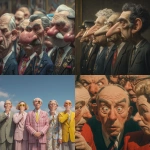Explore the Best AI Image Gallery

Beyond Pixels: 5G and the Future of Creative Expression
The fifth generation of cellular mobile communications, known as 5G, is more than just faster internet speeds. Its a transformative technology poised to revolutionize numerous industries, including the creative sector. With its ultra-low latency, massive bandwidth, and ability to connect billions of devices, 5G is paving the way for new forms of artistic expression, immersive experiences, and collaborative workflows.
A New Canvas for Artists
For artists, designers, and creators, 5G presents a vast canvas for innovation. Imagine sculpting digital masterpieces in real-time with collaborators across the globe, seamlessly integrating augmented reality (AR) into physical installations, or experiencing breathtakingly immersive virtual worlds that respond to your every movement.
Interactive Installations and Immersive Experiences
5Gs high bandwidth and low latency enable the creation of highly interactive installations and immersive experiences. Imagine walking through a gallery where sculptures react to your presence, soundscapes shift based on your movements, or paintings come alive with animated details. These experiences blur the lines between reality and virtuality, offering audiences a deeper level of engagement.
Collaborative Creativity
The global nature of 5G connectivity fosters collaboration like never before. Artists can work together in real-time on projects regardless of their location, sharing ideas, assets, and feedback instantly. This opens up exciting possibilities for international collaborations, bridging cultural divides through creative expression.
Augmented Reality and the Physical World
5G empowers AR applications that seamlessly blend the digital and physical worlds. Imagine a cityscape where historical buildings come alive with augmented information, or furniture previews overlaid onto your living room floor. This technology can transform everyday experiences, enriching our interactions with our surroundings.
The Ethical Landscape of 5G in Creativity
As with any powerful technology, the rise of 5G in the creative industry raises ethical considerations. Its crucial to address issues such as:
Data Privacy and Security
Collecting and utilizing user data for personalized experiences requires robust privacy protections. Transparency and user consent are paramount to ensuring responsible data handling practices.
Access and Equity
5Gs benefits should be accessible to all, regardless of socioeconomic background or geographic location. Bridging the digital divide is essential to ensure equitable opportunities for creative expression.
Authenticity and Ownership
The increasing use of AI and automation in creative processes raises questions about authorship and authenticity. Establishing clear guidelines and frameworks for intellectual property rights in the age of 5G is crucial.
Looking Ahead: The Future of 5G in Creativity
The future of 5G in the creative industry is brimming with possibilities. We can expect:
Enhanced Immersive Experiences
More realistic and interactive virtual worlds, driven by advancements in AR, VR, and haptics, will reshape how we create and experience art.
AI-Powered Creativity
AI tools will augment human creativity, assisting artists with tasks such as generating ideas, composing music, or designing intricate visuals.
Decentralized Creative Platforms
Blockchain technology and 5G connectivity will empower decentralized platforms, giving creators greater control over their work and fostering direct connections with audiences.
5G is not just about faster internet; its a catalyst for profound change in the creative landscape. By embracing its potential while addressing ethical considerations, we can unlock new frontiers of artistic expression, innovation, and collaboration.
](https://images.ai-img.art/thumbnails/150/8561b450506900783584c556bf57ccab16188eb111ae0b9ec0cc34841b9a6825.webp)



](https://images.ai-img.art/thumbnails/150/229d202f0ba192ad857509389a22aa5e3b948a813ee711996ae9d32631b486e0.webp)



](https://images.ai-img.art/thumbnails/150/546184a0cbf4b3d07f6ce10e72c0faf2a088fd4aac33c10422c11d76bf734be8.webp)
](https://images.ai-img.art/thumbnails/150/c064d275c74e06a80b37064ffe83a30913361f0a4602f9a669e8ecbdb37ec6ad.webp)


](https://images.ai-img.art/thumbnails/150/e3a2739669e7e25395e2cc5578f479057e60973d76d85724a5758b6e1039ee3c.webp)

](https://images.ai-img.art/thumbnails/150/7c569b0eb6e7eddaf8d96b3e3532d8b0de6a7d79916c0ef333632070a3085997.webp)





](https://images.ai-img.art/thumbnails/150/fe2cfa6e64066976325cd677ef63e43820c1843dc81bcf90c0b68dc300689e03.webp)




](https://images.ai-img.art/thumbnails/150/f401da92914cabe9929e88ee4a02fbe744702d0c12dcbbd71efa8cf4cf1a6fee.webp)








](https://images.ai-img.art/thumbnails/150/912c326dfe63108e4ca5cdcf408c2247b3e7d4afacde8aac324b06a9a4a6913c.webp)



](https://images.ai-img.art/thumbnails/150/2055d76bd9940ffa62a06896525d0f07a5b57bbe3b766a043d977b1c678d69c1.webp)
](https://images.ai-img.art/thumbnails/150/76d26b409b1a7acfd86a78c5d5047ff9bd7be9ecf55ce838cc2c854bf42c00be.webp)









](https://images.ai-img.art/thumbnails/150/5d3ed451a35bec12705494605ebbe909dc0f4319e9a6064ab824b39609ada54e.webp)